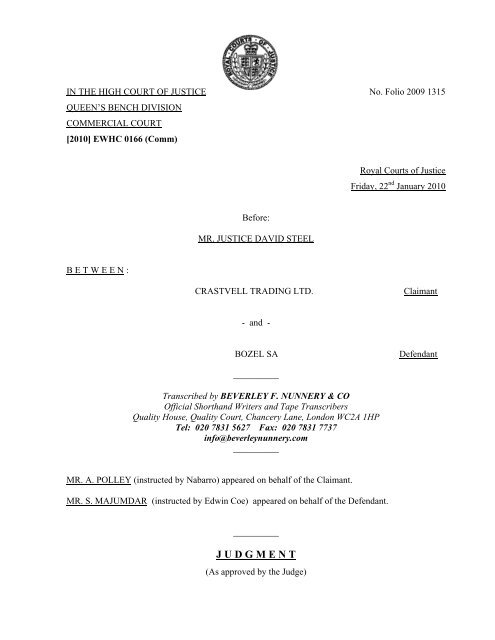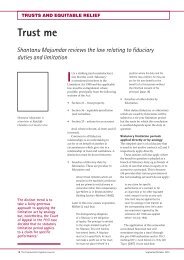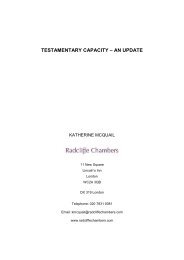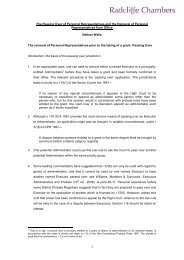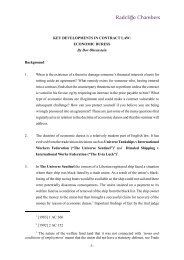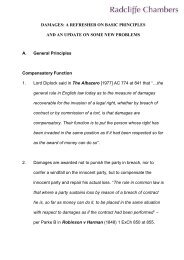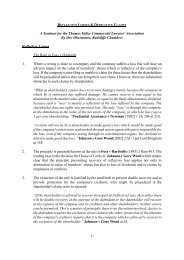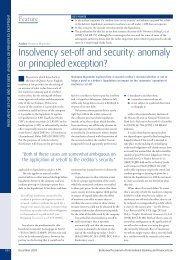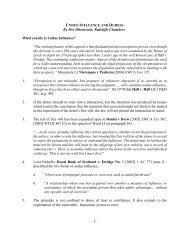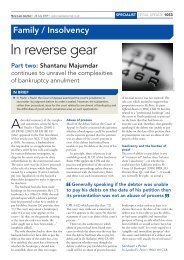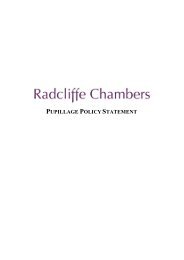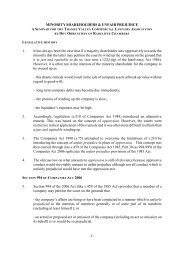Crastvell Trading Limited v Bozel SA - Radcliffe Chambers
Crastvell Trading Limited v Bozel SA - Radcliffe Chambers
Crastvell Trading Limited v Bozel SA - Radcliffe Chambers
You also want an ePaper? Increase the reach of your titles
YUMPU automatically turns print PDFs into web optimized ePapers that Google loves.
IN THE HIGH COURT OF JUSTICE No. Folio 2009 1315<br />
QUEEN’S BENCH DIVISION<br />
COMMERCIAL COURT<br />
[2010] EWHC 0166 (Comm)<br />
Royal Courts of Justice<br />
Friday, 22 nd January 2010<br />
Before:<br />
MR. JUSTICE DAVID STEEL<br />
B E T W E E N :<br />
CRASTVELL TRADING LTD.<br />
Claimant<br />
- and -<br />
BOZEL <strong>SA</strong><br />
Defendant<br />
__________<br />
Transcribed by BEVERLEY F. NUNNERY & CO<br />
Official Shorthand Writers and Tape Transcribers<br />
Quality House, Quality Court, Chancery Lane, London WC2A 1HP<br />
Tel: 020 7831 5627 Fax: 020 7831 7737<br />
info@beverleynunnery.com<br />
__________<br />
MR. A. POLLEY (instructed by Nabarro) appeared on behalf of the Claimant.<br />
MR. S. MAJUMDAR (instructed by Edwin Coe) appeared on behalf of the Defendant.<br />
__________<br />
J U D G M E N T<br />
(As approved by the Judge)
MR. JUSTICE DAVID STEEL:<br />
1 This is an application by the claimants for summary judgment. It is the claimants’<br />
case that there is no realistic prospect of the defendants successfully defending the<br />
claim that is brought against them and that there is no other compelling reason why<br />
the case should be disposed of at trial. I do not understand that alternative avenue<br />
as being a live proposition in the present application. Accordingly, the court can<br />
focus on the question whether the defendants have or have not a realistic prospect<br />
of defending the claim successfully.<br />
2 That criterion or test is the subject of numerous authorities. There is no dispute<br />
between the parties as to what it means. The defendants have got to establish that<br />
they have a case which is better than merely arguable. It is not sufficient that they<br />
can establish that there is a fanciful or imaginary prospect of fending off the claim.<br />
It is of course also established law that where there are substantial issues of fact the<br />
court will not conduct a mini trial, but nonetheless, the court is entitled to inspect<br />
the material that has been put before the court on factual issues and be satisfied that<br />
the defendants’ case on the issues of fact has some degree of conviction.<br />
3 The parties know what this case is all about and therefore I can introduce it very<br />
briefly. It is a claim for monies under three loan agreements. The defendants,<br />
<strong>Bozel</strong>, are a subsidiary of a company called Welgate. <strong>Bozel</strong>’s business is in the<br />
metals and minerals field. It is not necessary to recite the relevant terms of the<br />
agreement, save one provision which is common to all three of them, which is<br />
Clause 14 of the mezzanine loan agreement, and Clause 15 of the convertible<br />
mezzanine and convertible senior loan agreements. The principal part reads:<br />
“(1) Except as required by law, all payments due to the lender under this<br />
agreement will be made free and clear of all deductions and withholdings<br />
whether in respect of taxation, set-off, counterclaim or otherwise.”<br />
4 The monies had been borrowed to finance acquisition by <strong>Bozel</strong> of various other<br />
companies. The monies were originally repayable in July and August 2009. By<br />
January that year the <strong>Bozel</strong> Group (of which the defendants form a part) found<br />
itself in financial difficulties in the worldwide downturn, and in particular the fall<br />
in demand for steel. Two creditors of <strong>Bozel</strong> and the <strong>Bozel</strong> Group, namely the<br />
claimant and another company called Trafalgar Capital who had also effected<br />
loans, entered into a standstill agreement with <strong>Bozel</strong>. This agreement contemplated<br />
that <strong>Bozel</strong> would seek to restructure or refinance its obligations. To that end the<br />
creditors agreed not to take any enforcement action under the various loan<br />
agreements until June 2009, despite the fact that there had already accrued an event<br />
of default. It appears that Trafalgar were and remain on friendly terms with<br />
BEVERLEY F NUNNERY & CO<br />
OFFICIAL SHORTHAND WRITERS
Welgate and <strong>Bozel</strong>, but the relationship between Welgate and <strong>Bozel</strong> on the one<br />
hand and the claimants on the other deteriorated.<br />
5 When the standstill agreement came to an end in July 2009 the claimants sought to<br />
enforce its rights by taking various proceedings against <strong>Bozel</strong> and, for that matter,<br />
Welgate to whom they had also made a loan. The sum at stake was significant,<br />
some £13.5 million of which only a very small proportion had been repaid. One of<br />
the features of the various loans to <strong>Bozel</strong>, and indeed to Welgate, were share<br />
pledges in respect of the shares of <strong>Bozel</strong> and various subsidiaries. Those share<br />
pledges play somewhat of a significant role in the disputes that have subsequently<br />
arisen.<br />
6 It is one of the contentions that is advanced by the defendants that the history of<br />
events since the standstill agreement was entered into and the subsequent<br />
enforcement action that has been taken by the claimants demonstrates that far from<br />
being anxious to be repaid the money they loaned, the claimants want somehow to<br />
obtain the ownership of <strong>Bozel</strong> and its subsidiaries, or the shares in those<br />
companies, at some under value. I am bound to say that I see nothing in the<br />
documents which begins to support any such contention. To the contrary, it seems<br />
to me that the claimants have advanced their claim for recovery of the loan monies<br />
with some considerable vigour. It would be, on any view, a surprising situation if,<br />
in the context of a Part 24 application, the reality was that the claimants were<br />
anxious to lose and not recover the monies that were due to it.<br />
7 The fact that it has pursued its claim with some vigour is the source of some<br />
complaint on the part of <strong>Bozel</strong> and Welgate. The fact that the claimants have<br />
behaved in a somewhat hard-nosed manner may have ruffled feathers, but it does<br />
not seem to me to have any bearing on the justice of the matter or the appropriate<br />
outcome to this application.<br />
8 It seems that a significant number of proceedings have been instituted. First, even<br />
before the standstill agreement came to an end, a claim was instituted in Florida<br />
against a <strong>Bozel</strong> subsidiary incorporated in that state and various individuals. In the<br />
event, those proceedings were stayed by the Florida courts on the grounds of forum<br />
non conveniens. I need say no more about them. Secondly, as I have already<br />
intimated, there was a claim against Welgate in this court and judgment in default<br />
of acknowledgement of service or defence (I am not quite sure which) resulted.<br />
9 Having obtained judgment, the claimants took various steps. Firstly, and this is of<br />
particular materiality, they seized shares in <strong>Bozel</strong> owned by Welgate which had<br />
been pledged to them. They were situate in Luxembourg.<br />
BEVERLEY F NUNNERY & CO<br />
OFFICIAL SHORTHAND WRITERS
10 Secondly, they obtained a freezing order in the BVI, the jurisdiction of<br />
incorporation of Welgate, in which Welgate were restrained from disposing of any<br />
assets save in excess of the value of the claimant’s claim, and also sought an order<br />
for winding up of the company following a statutory demand.<br />
11 That latter order was duly made. It was followed by an application by Welgate to<br />
set that order aside. The grounds for so doing have an echo of the points that are<br />
being made by <strong>Bozel</strong> in the present proceedings, namely to the effect that in some<br />
respect the claimants had taken steps to prevent Welgate from obtaining refinance<br />
or otherwise repaying the loan from some other source. The application to set<br />
aside failed. The court held that there was no cross claim of the kind in fact<br />
intimated in the present proceedings which Welgate wished to pursue.<br />
12 Lastly, in relation to the proceedings in Luxembourg, the claimants sought a<br />
winding up order. That application was dismissed on the grounds that, as I<br />
understand it, the court was not satisfied that the inability to meet the loan<br />
repayments may have been only temporary. All this activity, in my judgment,<br />
supports the proposition that the interest of the claimants is indeed to recover its<br />
money and no more.<br />
13 The defendants say that the reason why the loans have not been repaid is because<br />
the defendants have been unable to refinance the loan. It is submitted that the<br />
reason they have been unable to refinance the loan is because the claimants have<br />
taken every possible step to be obstructive and prevent the defendants from making<br />
a successful agreement with third parties to provide funds, almost all those<br />
potential agreements being on the basis that the third party would purchase the<br />
shares in the <strong>Bozel</strong> group of companies.<br />
14 This immediately raises what seems to me to be an important threshold issue,<br />
namely whether, on the assumption that such a counterclaim is a good claim<br />
(namely that the claimants did indeed conduct itself in that way and secondly that<br />
such conduct was in breach of the loan agreement, and thirdly that the impact of<br />
the conduct was to prevent the refinancing) does the consequential counterclaim<br />
constitute a ground for refusing judgment on the claim? Of course, in this respect,<br />
the claimants rely upon the no set-off clauses (if I may call them that) in the<br />
various loan agreements.<br />
15 The legitimacy of the parties entering into an agreement whereby they separate out<br />
frontline claims on their agreement from cross claims, so that judgment can be<br />
accorded on the claim, leaving the defendant to advance his cross claim in due<br />
course, has received the clearest possible judicial approval in Coca Cola Financial<br />
Corporation v. Finsat (six) [1998] QB 43. Just to cite from the judgment of Neill<br />
LJ at page 52:<br />
BEVERLEY F NUNNERY & CO<br />
OFFICIAL SHORTHAND WRITERS
“Moreover, I can see no reason in principle why parties who are in general<br />
a contractual relationship cannot isolate one contract or one aspect of their<br />
dealing and provide their rights in relation thereto are to be treated<br />
separately from their other dealings.”<br />
16 Accordingly, what the claimants say in the present proceedings is that they are<br />
fully entitled to obtain judgment on their claim, leaving the defendants (if so<br />
advised) to advance their counterclaim in due course.<br />
17 The answer that is advanced in regard to that proposition is that the claim which the<br />
defendants wish to advance on the basis of the alleged implied term (which, for<br />
present purposes we must assume to be a good claim) means that there will be a<br />
claim which is pari passu with the loan monies, and accordingly, within the<br />
meaning of the set-off provisions in the loan agreements, the payments said to be<br />
due to the lender under the agreement are not in fact “due”. Therefore the bar to<br />
the effect that the claim be free and clear of deductions and withholdings such as<br />
set-off has no application on the facts of this case.<br />
18 The basis of this submission, as I understand it, is founded on a judgment of Mr.<br />
Geoffrey Brice QC in a case called Schenkers Ltd v. Overland Shoes. In that case<br />
the relevant clause provided that: “The customer shall pay to the company in cash<br />
or as otherwise agreed all sums immediately when due, without reduction or<br />
deferment on account of any claim, counterclaim or set-off”. The issue that arose<br />
from that case was the question whether such a provision fell foul of the Unfair<br />
Contract Terms Act. Perhaps not surprisingly, the plaintiff was anxious to restrict<br />
the apparently wide nature of that provision so as to support its claim that the term<br />
was a reasonable one.<br />
19 The outcome can be discerned from a passage at page 502 in the report [1998] 1<br />
Lloyd’s Rep 498 where the learned judge said this:<br />
“The no set-off provision of Clause 23(a) is very wide indeed. Mr. Irvine<br />
for the plaintiff contended that the clause did not apply to a defence to a<br />
particular transaction as opposed to complaints arising from other earlier<br />
transactions. Indeed, it was, or appeared to become, common ground that<br />
the reduction or deferment referred to in the clause related only to<br />
transactions other than the particular transaction with which the plaintiff’s<br />
invoice was concerned. The reason for this was the use of the expression<br />
‘when due’, and it was accepted that if there was a defence to an individual<br />
invoice when the sum so claimed was not due, I agree with this<br />
construction.”<br />
BEVERLEY F NUNNERY & CO<br />
OFFICIAL SHORTHAND WRITERS
20 It is always difficult to extract from a passage of that kind the precise scope of the<br />
conclusion of law that was being reached, not least because what the learned judge<br />
concluded was in effect the outcome of an agreement. The parties were ad idem on<br />
this topic.<br />
21 It is consistent with the proposition that where a claim to a debt, for instance, can<br />
be met by a substantive defence to the claim, then by definition the sum that is<br />
claimed is not due. But if, as is suggested by the defendants, the effect of the<br />
application of that decision to the present case is to conclude that some but not all<br />
set-offs result in the consequence that there is no sum due, that is a surprising<br />
outcome, if not a commercially absurd one.<br />
22 My conclusion is that it is necessary for the relevant cross claim to actually impugn<br />
the claim itself and such does not arise on any view in this case. That conclusion is<br />
consistent, it seems to me, with authority.<br />
23 So far as the textbooks are concerned, in Derham The Law of Set-Off Third<br />
Edition paragraph 5.86 the topic is dealt with in this way:<br />
“A contract may include a provision to the effect that one party must pay all<br />
sums immediately when due without deduction or set-of. It is unlikely that<br />
a contract in those terms would be affected … equitable set-off in relation<br />
to a damages cross claim which is inseparably connected with a debt the<br />
subject of the plaintiff’s claim because the substantive nature of the set-off<br />
would mean the plaintiff could not assert that the debt is due for the<br />
purposes of the clause.”<br />
24 On the facts of the present case that does not arise. The cross claim does not<br />
impugn the claim. In July 2009 all the sums under the loan agreements became<br />
due. The liability of the defendants accrued. The cross claim and the alleged setoff<br />
all arise out of subsequent events giving rise to a claim for breach arising during<br />
the course of the period in which the defendants were seeking to obtain monies to<br />
repay the claim. In my judgment, that cannot possibly constitute a bar to the<br />
recovery of the claim, having regard to the terms of the loan agreements.<br />
25 I am fortified in that conclusion by two decisions of the Court of Appeal: Stewart<br />
Gill Ltd. v. Horatio Myer & Co Ltd [1992] 1 QB 600 and Fastframe v. Lohinski a<br />
decision of the Court of Appeal in March 1993 where although the issue was not<br />
the subject of any dispute between the parties, both courts concluded in agreement<br />
with the parties that a clause of this kind would preclude a cross claim which does<br />
not impugn the debt. As I say, although not argued, it seems to me to be significant<br />
support for the conclusion that I have reached.<br />
BEVERLEY F NUNNERY & CO<br />
OFFICIAL SHORTHAND WRITERS
26 The defendants’ counter to this was broadly along the lines that the circumstances<br />
here, as they contend, where the claimants prevented the defendants from<br />
refinancing the loans did establish a very close connection, or at least a sufficiently<br />
close connection, with the claim to justify the cross claim being treated as not<br />
excluded by the terms of the agreement. It was submitted that there was a difficultto-define<br />
spectrum of cross claims giving rise to potential equitable set-offs, some<br />
of which were sufficiently closely connected with the claim and some of which<br />
were not.<br />
27 I am bound to say that my view is that the cross claim, even if this approach is<br />
correct, does not have remotely sufficiently close connection with the claim, given<br />
that the claim became due well before the cross claim did ever arise. But in my<br />
judgment any commercial reading of the terms of the set-off clause in these<br />
agreements must be read as justifying the disregard of all set-offs and all<br />
counterclaims, unless the impact of the set-off is such as to render the underlying<br />
claim invalid or void.<br />
28 That is sufficient to dispose of the present proceedings in the sense that it is<br />
common ground that if that conclusion is correct, any analysis of the cross claim is<br />
rendered redundant. But I will, nonetheless, say a little about the cross claim itself.<br />
This is said to arise under an implied term within the agreement. I think the<br />
defendants recognise that they had some difficulty in formulating the precise terms<br />
of the implied term. What eventually was contended, as I understand it, is that<br />
there was an implied term that the claimants would not take active steps to prevent<br />
or impede the defendants from raising finance with which to repay the loan.<br />
29 I have of course been reminded of the decision of the Privy Council in Attorney<br />
General of Belize v. Belize Telecom [2009] 1 WLR and the various passages in the<br />
speech of Lord Steyn and relating to the basis upon which it is appropriate to imply<br />
a term. By way of summary, the Privy Council found that whilst there were a<br />
number of criteria which had been used from time to time by the courts in<br />
embarking upon the task of finding what should be implied and/or what the<br />
contract would mean (namely reference to what is reasonable and equitable,<br />
reference to what gives business efficacy to the contract, what is so obvious it goes<br />
without saying, what is capable of being clearly expressed, and what does not<br />
contradict an express term of the contract) were not to be seen as independent tests.<br />
There was a collection of different ways in which the judges have tried to express<br />
the central idea that the implied term must spell out what the contract actually<br />
means.<br />
30 The starting point here, it seems to me, is that any attempt to imply a term in regard<br />
to this contract must be embarked on by an analysis of the express terms in the<br />
factual matrix in which the contract was entered into. The fact that in due course,<br />
BEVERLEY F NUNNERY & CO<br />
OFFICIAL SHORTHAND WRITERS
after the loans became due, a dispute arose with regard to the ability of the<br />
defendants to repay the loan and the extent to which the claimants were interfering<br />
with it, were not matters which were within the consideration of the parties when<br />
they entered into the agreement. Of course, I readily accept that the court would<br />
imply a term to the effect that the claimants would not take steps to prevent the<br />
performance of the defendants’ repayment obligations, namely their obligation to<br />
repay when those sums came due. But at the due date it is not suggested that the<br />
claimants had, at that stage, taken any steps to impede the defendants from<br />
repaying the loan. The reason why the defendants did not repay the loan was quite<br />
straightforward: they did not have any money. That is why they did not pay on the<br />
due date.<br />
31 There seem to me to be serious difficulties about implying a term relating to what<br />
steps the claimants could take after their loan became due and repayable. It is<br />
obvious that the claimants will wish to enforce its right to repayment and in the<br />
process to ensure that it does not lose any security. In that latter regard, the<br />
claimants would want to ensure that a third party is not invited to embark on a<br />
course of action which would prejudice the claimants’ claim and/or defendants’<br />
security. The term that is being suggested by the defendants would effectively<br />
impede the claimants from enforcing its justified rights. I see absolutely no need to<br />
incorporate or imply any such term. To the contrary, it would be quite improper.<br />
32 There is, it seems to me, some force in the proposition that what the defendants are<br />
seeking to do by virtue of this argument is either to raise a complaint in regard to<br />
the standstill agreement (which is not made), or alternatively to promote a claim<br />
which might more properly be advanced by way of economic tort. Furthermore,<br />
there is, it seems to me, a serious difficulty on the facts. The high spot of the<br />
defendants’ case is that an agreement with a firm called Trilliant with Welgate was<br />
stymied by the claimants. The material that touches on that issue, which is<br />
contained within the bundle and has been read to the court, does not seem to me to<br />
begin to make good that complaint.<br />
33 What had happened was that Welgate had entered into negotiations with a firm<br />
called Trilliant with a view to Trilliant purchasing the shares of <strong>Bozel</strong>. Wind of<br />
this got out in the course, as I understand it, of the Luxembourg proceedings, albeit<br />
of a slightly different transaction. On 11 th September 2009 the claimants wrote to<br />
Trilliant recording the fact that it was understood that Trilliant were going to buy<br />
the shares of the <strong>Bozel</strong> subsidiaries, and complaining that despite the fact that<br />
Trilliant purported to be acting with the cooperation of the claimant, it had in fact<br />
never contacted them. More importantly perhaps even than that, it was pointed out<br />
that Trilliant had never approached the claimants in order to ensure that the<br />
recovery of their loan was protected by payment of all or part of the proceeds of<br />
BEVERLEY F NUNNERY & CO<br />
OFFICIAL SHORTHAND WRITERS
sale into an escrow account for their benefit. Not surprisingly, they sounded a<br />
warning as to that plan.<br />
34 The response from American lawyers acting for Trilliant explained that they were<br />
proceeding on the basis of concern on the part of their clients that the claimants had<br />
interfered with or frustrated an earlier deal involving Jessop & Lamont, and had<br />
decided to move forward without the participation of the claimants. It was<br />
announced that after careful deliberation, as it was put, they had decided to change<br />
tack and had embarked on the negotiation, as I understand it, with Welgate for an<br />
acquisition of the <strong>Bozel</strong> shares, the claimants being sent by copy of that letter.<br />
Attention was drawn to the fact that following the sale of the shares it was intended<br />
that £20 million of the sums involved should be used to repay the outstanding<br />
<strong>Bozel</strong> debts to Trafalgar on the one hand and the claimants on the other.<br />
35 Again, not surprisingly, this provoked a somewhat brusque response from the<br />
claimants, drawing attention to the fact that the shares of <strong>Bozel</strong>, which were<br />
purportedly to be sold by Welgate to Trilliant, had been seized in Luxembourg as a<br />
result of the default judgment against Welgate, and that the claimants were seeking<br />
to obtain a court decision for the sale of those shares on a public sale, and that<br />
interference with a court sale was not legally proper, and suggesting that the<br />
transaction that Trilliant and Welgate were embarking on was not permissible.<br />
36 In my judgment, there is nothing in that material which could be regarded as<br />
improper or in breach of any obligation to be of reasonable assistance to the<br />
defendants in meeting their obligations. All that is happening is that the claimants<br />
were exercising their legitimate legal rights to recover the sums due to them, and to<br />
do so, amongst other things, by exercising the security they had over the pledged<br />
shares.<br />
37 Lastly, if that was not enough, there is no material that I have seen which persuades<br />
me that it is arguable that the steps taken by the claimants to protect its interests<br />
actually led to any breakdown of the negotiations with Trilliant, which in fact<br />
continued for a considerable time thereafter.<br />
38 It follows that even if I were not satisfied that the set-off clauses did not bar the<br />
counterclaim, the counterclaim itself has no realistic prospect of success. For all<br />
those reasons, I grant the claimants the relief they seek.<br />
MR. POLLEY: My Lord, I am very grateful. You have seen the draft order already.<br />
So far as I know there is no contention about it. I know my learned friend has<br />
calculated it, although I do not know how helpful it will be to finalise the<br />
BEVERLEY F NUNNERY & CO<br />
OFFICIAL SHORTHAND WRITERS
schedules. Those instructing me have been beavering away to get those right. The<br />
order I seek is before your Lordship. I would ask for costs.<br />
My Lord, in relation to costs there is a clause in the contract which is set out in the<br />
particulars of claim which provides, as many of these agreements do, for<br />
contractual costs on the indemnity basis. Your Lordship will know the ordinary<br />
rule is in those circumstances they are supposed to be fair and reasonable. Of<br />
course, your Lordship’s discretion is not ousted, if your Lordship wants to order<br />
costs on a different basis. In my submission, this is a proper case for indemnity<br />
costs given the contractual clause.<br />
MR. JUSTICE DAVID STEEL: Does the contractual clause have the effect that it is not<br />
open to the defendants to assert that any part of the claim for costs is unreasonable?<br />
MR. POLLEY: My Lord, no, absolutely, they can take those points.<br />
MR. JUSTICE DAVID STEEL: Just an ordinary indemnity order.<br />
MR. POLLEY: What it does, my Lord, is shift the presumption effectively, so that the<br />
court will ordinarily assume.<br />
MR. JUSTICE DAVID STEEL: What I was wanting to know is what is the implication<br />
of the contractual provision that costs will be on an indemnity basis? Simply that<br />
an indemnity basis in so far as a detailed assessment, if undertaken?<br />
MR. POLLEY: Yes, my Lord, or a summary assessment.<br />
MR. JUSTICE DAVID STEEL: Or a summary assessment. Let us try to deal with<br />
those three points first. Is there any issue about the terms of the order in respect of<br />
the sums claimed, or are you unable to help me on that?<br />
MR. MAJUMDAR: As my learned friend says, I have a calculator, but even if I had<br />
access to the relevant libel figure it would take quite a long time. The answer is I<br />
do not know. It is plausible.<br />
MR. JUSTICE DAVID STEEL: I will not sign an order today. I will give the parties<br />
until Tuesday close of play to reach an agreement on what sums are due and to<br />
include such in an agreed form of order.<br />
Is there a dispute that the claimants are entitled to their costs?<br />
MR. MAJUMDAR: My Lord, no.<br />
BEVERLEY F NUNNERY & CO<br />
OFFICIAL SHORTHAND WRITERS
MR. JUSTICE DAVID STEEL: Is there a dispute that they are entitled to them on an<br />
indemnity basis?<br />
MR. MAJUMDAR: My Lord, no. That seems to be standard.<br />
MR. JUSTICE DAVID STEEL: Let me see the schedule now.<br />
MR. POLLEY: I have it here. I do not if your Lordship has seen it. (Handed) I have<br />
not looked at it in great detail myself. I also have not seen my learned friend’s<br />
costs schedule to the extent that may be relevant. Your Lordship sees the grand<br />
total is just shy of £40,000.<br />
MR. JUSTICE DAVID STEEL: Is there any particular point that you wanted to draw to<br />
my attention?<br />
MR. POLLEY: I do not think so, my Lord. This is a £14 million claim. This is a<br />
substantial piece of litigation. My learned friend’s client raised a number of issues<br />
which had to be dealt with as factual issues.<br />
MR. JUSTICE DAVID STEEL: Mr. Majumdar, any comments on this?<br />
MR. MAJUMDAR: My Lord, I have seen it only a few seconds ago, and that is not just<br />
because it has just been supplied by the other side but because I had not been given<br />
it.<br />
MR. JUSTICE DAVID STEEL: I cannot resist asking you what your costs are.<br />
MR. MAJUMDAR: I do not know. I have not seen our schedule.<br />
MR. POLLEY: So we are both in the dark as to that, my Lord!<br />
MR. MAJUMDAR: My Lord, I am just going to comment on the scribbled notes that<br />
have been made by those sitting behind me. Starting at the bottom, attention is<br />
drawn to the photocopying and binding costs.<br />
MR. JUSTICE DAVID STEEL: £860, yes. I thought that was how solicitors made<br />
most of their money!<br />
MR. MAJUMDAR: I am objecting to that! My Lord, looking further up the page,<br />
attendances on documents, the figures claimed for Grade B and C fee earners. That<br />
comes to something like 35 hours which again struck us as being quite a lot.<br />
Attendances on others and not even on the client. Again, that seems to be quite a<br />
lot of time spent.<br />
BEVERLEY F NUNNERY & CO<br />
OFFICIAL SHORTHAND WRITERS
MR. JUSTICE DAVID STEEL: Yes. Attendances on colleagues is a rather strange<br />
concept. It may be popping round next door and saying: what do you think?<br />
MR. MAJUMDAR: Yes. Cumulatively that seems like quite a lot of time under that<br />
category.<br />
MR. JUSTICE DAVID STEEL: What is your offer, around two bases, either all in or<br />
alternatively by way of payment on account?<br />
MR. MAJUMDAR: The figure of 18 all in is suggested from behind.<br />
MR. JUSTICE DAVID STEEL: Thank you. Mr. Polley, attendance on colleagues is an<br />
unusual item.<br />
MR. POLLEY: My Lord, may I just take instructions very briefly. (Pause) My Lord,<br />
what I can say about that is your Lordship will see that category includes a number<br />
of things. Attendances on the court includes, for instance, being at this hearing<br />
which was, at one stage, scheduled to take an entire day. So there are a couple of<br />
hours in that respect. Attendances on colleagues involves internal discussions<br />
within my instructing solicitors, Nabarro, about the case. It is impossible at this<br />
stage to get a detailed breakdown.<br />
MR. JUSTICE DAVID STEEL: Between the people named.<br />
MR. POLLEY: Yes, for instance Mr. Warne speaking to Mr. Taplin or whatever. My<br />
Lord, I think that is all I can helpfully say on the material in front of me. In<br />
relation to attendances on documents, very briefly, without seeing my learned<br />
friend’s costs schedule it is very difficult to know what the sensible comparator<br />
would be. In relation to photocopying and binding, I am told that is what it cost us,<br />
my Lord, as simple as that. The suggestion that £18,000 which is less than half, is<br />
the appropriate measure on an indemnity basis in a claim of this magnitude is --<br />
MR. JUSTICE DAVID STEEL: An option: £35,000 all in or £25,000 on account?<br />
MR. POLLEY: My Lord, I will just take instructions. (Pause)<br />
MR. JUSTICE DAVID STEEL: A good example of a discussion between colleagues.<br />
MR. POLLEY: My Lord, this is a discussion with a client in fact; this is attendances on<br />
clients!<br />
MR. JUSTICE DAVID STEEL: I see. (Pause)<br />
BEVERLEY F NUNNERY & CO<br />
OFFICIAL SHORTHAND WRITERS
MR. POLLEY: My Lord, the instructions are £35,000 all in would be acceptable to us.<br />
MR. JUSTICE DAVID STEEL: £35,000 payable within 14 days. Thank you very<br />
much.<br />
MR. MAJUMDAR: My Lord, one more matter. My clients are not here, but may I ask,<br />
so that I can say that I asked, for permission to appeal?<br />
MR. JUSTICE DAVID STEEL: On all of it or which part?<br />
MR. MAJUMDAR: On all of it.<br />
MR. JUSTICE DAVID STEEL: I do not think it is appropriate for me to grant leave. I<br />
have concluded that there is no realistic prospect of defending the claim. It must<br />
follow therefore that there is no realistic prospect on an appeal and leave is refused.<br />
Thank you both very much.<br />
__________<br />
BEVERLEY F NUNNERY & CO<br />
OFFICIAL SHORTHAND WRITERS


